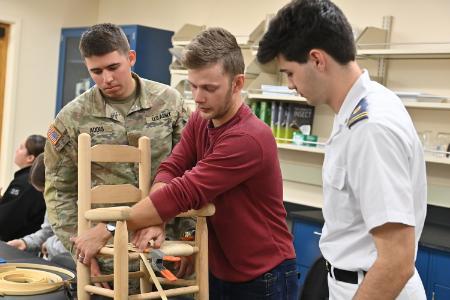Botany Class Learns Practical Uses

Andrew Hart instructs Joshua Addis ’25 and Luke Cockerham ’26 on splint bottom weave caning during their botany class Oct. 17. —VMI Photo by Kelly Nye.

LEXINGTON, Va. Oct. 24, 2024 — Seven cadets enrolled in a general botany class at Virginia Military Institute, participated in a unique learning-by-doing exercise recently. Col. Anne Alerding, professor in the Department of Biology, whose specialty is plant biology, makes a point to bring practical applications into class, enhancing the learning experience of her students.
“I incorporate human uses of plants into my labs. For example, sushi making with algae, terrarium-making with mosses and ferns, autumn leaf bookmark making with collected and pressed leaves, and the Japanese method of ikebana flower arranging, but this was the first time we’ve had a hands-on experience for the students to participate in and learn an ancient and valuable human use of stems. It combines community involvement in the classroom with students learning an artisanal skill.”
Alerding met local chair caner, Andrew Hart, a few years ago at the Rockbridge Community Festival. A carpenter by trade, Hart started caning four years ago as a hobby. It wasn’t long though before his pastime grew into a successful full-time business called Pleasure to Seat You. Alerding invited Hart to demonstrate his craft in her class Oct. 17.
Among other botanical mediums, Hart uses flat reed, the inner core of the rattan palm, to cane. The plant is similar to sugar cane and bamboo. It was with the flat reed that Hart taught the cadets, who worked in pairs, how to splint bottom weave the seat of a child’s chair.
Joshua Addis ’25, a biology major from Fredericksburg, found the exercise enjoyable yet challenging.
“The techniques used to get the chair to look absolutely perfect was difficult. Fortunately we had an expert showing us along the way. I believe that by learning the practical uses, or as we refer to them in class as human uses, we are better able to understand the individual plants we are learning about,” shared Addis.
Marianne Hause
Communications & Marketing
VIRGINIA MILITARY INSTITUTE
.svg)
.png)